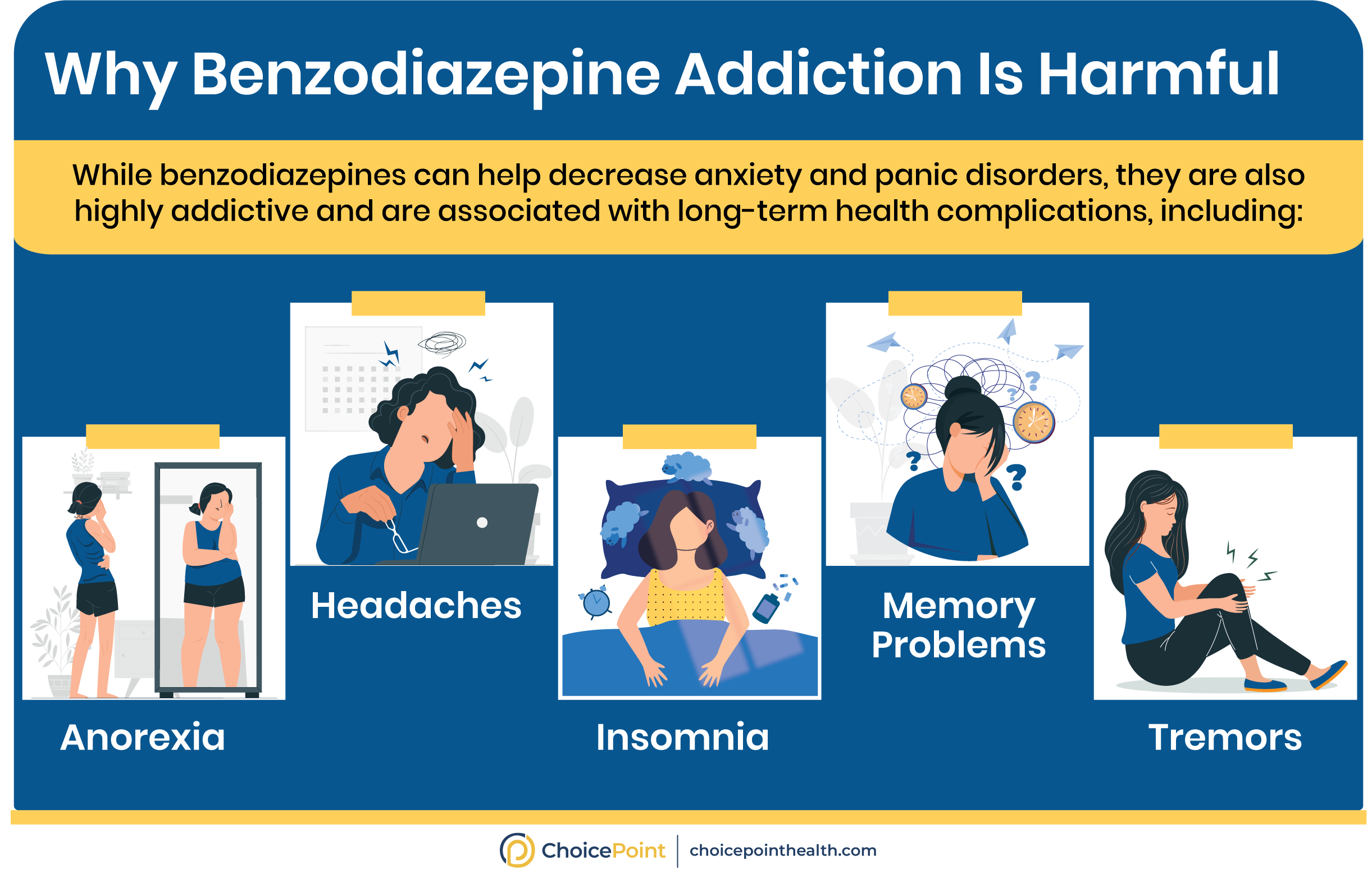You will be shocked to read that 375,000 individuals in New Jersey abuse Benzodiazepines, and 24% of Bergen County, NJ drug-related deaths are reportedly from Benzodiazepine overdose. The length of benzodiazepine detection in your system may vary. Some tests may indicate its presence for hours, days, weeks, or even months after intake. Take a look at why you should not take benzodiazepines without a prescription and how long do Benzos stay in your system.
You and your loved ones deserve to overcome addiction. Start your recovery journey with ChoicePoint today.
Table of Contents
What are Benzodiazepines?
Benzodiazepines, commonly referred to as ‘benzos,’ are DEA-regulated medications that are also known as ‘downers’ on the streets. The FDA has approved them for a variety of conditions, including:
- insomnia
- anxiety, alcohol withdrawal
- epilepsy
These medications reduce brain activity by increasing the effects of GABA, a neurotransmitter that helps the brain relax.

Did you know? That mixing benzodiazepines and alcohol may be extremely dangerous? Both substances depress the central nervous system, leading to increased sedation, respiratory depression, and potentially fatal overdose.

Did you know? That mixing benzodiazepines and alcohol may be extremely dangerous? Both substances depress the central nervous system, leading to increased sedation, respiratory depression, and potentially fatal overdose.
Commonly Prescribed Benzodiazepines in NJ USA
Benzodiazepines are a type of medication that helps calm the brain and nervous system. They’re used to treat conditions like anxiety, stress, epilepsy, agitation, insomnia, and certain seizure disorders. Here is a brief list of commonly prescribed Benzos in NJ USA:
Please note this assessment is an initial self-screening, and it is not meant to be a medical assessment or clinical diagnosis of addiction. For proper diagnosis and treatment, schedule an appointment with ChoicePoint.
How Long Do Benzos Stay in Your System?
Did you know that Benzos can be identified in routine drug testing, such as urine, hair, saliva, and blood tests? The individual medicine determines the duration of the benzo’s presence in your system. Here are some rough estimates of detection times of different types of Benzos in your system:
1. Xanax In Your System
Xanax (Alprazolam) is a fast-acting benzodiazepine for anxiety disorders and panic attacks.
How Long Does Xanax Stay In Urine?
Xanax is detectable for 3 to 7 days following the last administration.
How Long Does Xanax Stay In Blood?
Xanax may be detected in blood samples for a duration of 1 to 2 days following the last ingestion.
How Long Does Xanax Stay In Hair?
While detection times depend upon hair sample length, Xanax may be detected in hair follicles for up to 1-7 days post-administration.
How Long Does Xanax Stay In Saliva?
In saliva, it can be detected for up to 2.5 days following the last administration, a shorter duration than urine.
2. Ativan In Your System
Ativan (Lorazepam) is used to treat anxiety disorders, seizures, and insomnia with a calming effect.
Ativan In Urine
It can typically be detected in urine for up to 3-6 days after the last use.
Ativan In Blood
Ativan has a shorter blood detection window than urine, typically detectable for 6-8 hours post-administration, potentially longer with regular use.
Ativan In Hair
Ativan exhibits a prolonged detection period in hair follicles compared to other specimens, making detection possible for up to 90 days after the last administration.
Ativan In Saliva
Ativan can generally be identified in saliva for a period ranging from 8 hours to 3 days following the last use.
3. Valium In Your System
Valium (Diazepam) is a Benzodiazepine for anxiety disorders, muscle spasms, and alcohol withdrawal.
How Long Does Valium Stay In Your Urine?
Valium typically remains detectable in urine for 3 to 7 days after the last dose.
How Long Does Valium Stay In Your Blood
Valium can be detected in blood 6-48 hours after the last dose, shorter than its detection time in urine.
How Long Does Valium Stay In Your Hair
As detection time varies based on the length of the hair sample, valium can be detected in hair for up to 90 days after the last dose.
How Long Does Valium Stay In Your Saliva
Valium can typically be detected in saliva for 1 to 10 days following the last dose.
4. Klonopin In Your System
Klonopin (Clonazepam) is a long-acting benzodiazepine for panic disorder, seizures, and social anxiety disorder.
Urine
Klonopin is generally identified in urine for 5 to 7 days following the last dose.
Blood
Klonopin is typically detectable in blood for 1 to 3 days after the last dose, a shorter duration than urine.
Hair
Klonopin can be detected in hair for up to 90 days after the last dose, with detection time varying based on the length of the hair sample.
Saliva
Klonopin can generally be detected in saliva for 1 to 4 days following the last dose.
5. Restoril In Your System
Restoril (Temazepam) is prescribed for insomnia with a calming effect on the central nervous system.
Restoril In Urine
Restoril can typically be detected in urine for up to 3-7 days after the last use.
Restoril In Blood
Restoril has a shorter detection window in blood compared to urine. It can usually be detected for up to 1-3 days after the last use.
Restoril In Hair
Restoril can be detected in hair follicles longer than in other samples. It can be detected for up to 90 days after the last use, depending on the length of the hair sample.
Restoril In Saliva
Restoril can be detected in saliva for a shorter period than urine, typically up to 1-3 days after the last use.

Risks Associated with Long-Term Benzodiazepine Use
5 Common Factors that May Determine How Long Do Benzos Stay in Your System
After complete absorption, benzodiazepines stay in the body for a specific duration, which varies depending on the following factors:
- Age– Benzodiazepines tend to linger longer in the system of older individuals.
- Kidney Function- Certain benzos, like chlordiazepoxide and lorazepam, may stay in the system longer if kidney function is impaired.
- Liver Function– Liver issues may also become the reason for the prolonged presence of benzodiazepines, particularly chlordiazepoxide, diazepam, and lorazepam.
- Benzo Dose– A higher dose of benzos may prolong the elimination process.
- Frequency of Use– Regular Benzodiazepine users experience slower clearance compared to those who use it infrequently; single doses are eliminated faster.
Consequently, the duration for the body to clear benzodiazepines differs from person to person. These substances may be detected in the system for varying periods, ranging from days to months. Therefore, there is yet to be a set timeframe for their elimination. However, after about 5 elimination half-lives, a drug is nearly eliminated from the body.
Benzodiazepines In Your System: Types of Drug Testing at Benzo Rehab Center in NJ
When it comes to detecting benzodiazepines in your system, various types of drug testing methods may be employed. These may include:
- Urine Testing- Most common and accurate for several weeks. It measures metabolites filtered through the kidneys.
- Saliva Testing- Accuracy best within hours of drug use. It is considered as a less invasive option as compared to urine testing.
- Hair Testing- Can detect drug use up to three months in the past. It is less commonly used for contemporary use.
- Blood Testing- Accurate within a few days of use, invasive and expensive.
- Perspiration Testing- Least common, used in parole cases for long-term monitoring; results can take up to two weeks.
Benzodiazepine Addiction Treatment Procedure
Once an individual begins Benzodiazepine Addiction Treatment, they may be offered multiple treatment programs:
a. Medical Detox
Patients can choose to get round-the-clock medical care as they discontinue Benzodiazepine use. Benzo withdrawal symptoms should be handled under professional care.
b. Residential Rehab
After the Benzodiazepines are totally out of a patient’s system, they can stay at the rehab and focus on addiction treatment and recovery. Patients are taught coping methods for living a benzo-free life at an Inpatient rehab.
c. Outpatient Rehab
Following residential rehab, or instead, if individuals have a less serious Benzo addiction, patients might choose to live outside the facility and attend an outpatient rehab. They may begin their life without Benzos while receiving Benzo addiction treatment. Telehealth services may also be available.
d. Aftercare
Rehab is just the start of the recovery process. After rehab, aftercare programs provide ongoing assistance as you navigate life without benzos. This may include support groups and relapse prevention measures.
e. Co-Occurring Disorders
If individuals are struggling with benzos and mental health concerns, complete treatment can help them get off them while also treating their underlying mental health condition. A dual diagnosis program may be the best when it comes to addressing mental health along with physical health.
ChoicePoint has a team of highly competitive and DEA-certified practitioners. Visit our facility center in Fairlawn, New Jersey. For more information, call us at 844.445.2563 now! We accept most insurance plans; verify them and get started today!
Frequently Asked Questions About How Long Do Benzos Stay in Your System
Here are the most asked questions regarding how long do Benzos stay in your system.
What Medication Makes You Test Positive For Benzos?
The following medication may cause a false positive:
- Oxaprozin (Daypro)
- Sertraline (Zoloft)
- Tolmetin (Tolectin)
- Naproxen (Aleve)
- Etodolac (Lodine)
- Fenoprofen (Nalfon)
Where Are Benzodiazepines Metabolized?
The liver breaks down benzodiazepines. Enzymes break them down or connect to a molecule, allowing urine to be removed. This influences how long they stay in your body.
Do Different Types Of Benzos Stay In Your System For Different Lengths Of Time?
Yes! The duration benzos stay in the system may vary based on the specific type of benzodiazepine due to differences in half-life and metabolism.
What Is The Longest Acting Benzodiazepine, and What Is The Shortest Half-life Of Benzodiazepines?
The longest-acting benzodiazepine is flurazepam, and the shortest half-life of benzodiazepines is found in triazolam.
How Long Can You Test Positive For Benzodiazepines?
You can test positive for benzodiazepines for up to several days, depending on factors such as the specific benzodiazepine used, frequency of use, and the type of test performed.
Medical Disclaimer:
ChoicePoint aims to improve the quality of life for people struggling with substance use disorder and mental health issues. Our team of licensed medical professionals research, edit and review the content before publishing. However, this information is not intended to be a substitute for professional medical advice, diagnosis, or treatment. For medical advice please consult your physicians or ChoicePoint's qualified staff.










